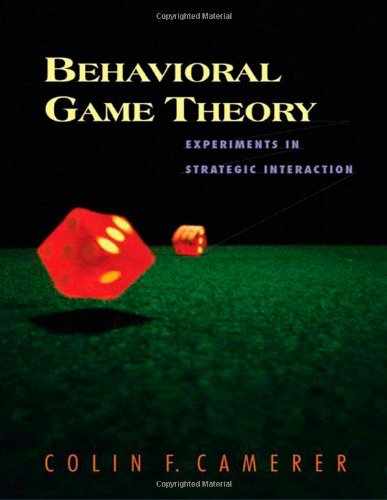Behavioral Game Theory: Experiments in Strategic Interaction book download
Par bingman sheila le mercredi, juin 29 2016, 13:47 - Lien permanent
Behavioral Game Theory: Experiments in Strategic Interaction by Colin F. Camerer


Download eBook
Behavioral Game Theory: Experiments in Strategic Interaction Colin F. Camerer ebook
Page: 248
Format: pdf
ISBN: 0691090394, 9780691090399
Publisher: Princeton University Press
Experimental economics utilises game theory, which proves to be a useful tool in investigating strategic interaction between decision-making players. Camerer, Behavioral Game Theory: Experiments on Strategic Interaction, Princeton University Press, Princeton, 2003. For this reason neuroeconomics as an actual science will probably influence economics in a similarly positive way cognitive psychology and behavioural economics have. Behavioral game theory: Experiments in strategic interaction. Unifying a wealth of information from ongoing studies in strategic behavior, he takes the experimental science of behavioral economics a major step forward. In all, 155 adults and 157 171-196). Since then, we have released four versions of Course Builder adding features such as user-friendly content development, administrative support, dashboards on student performance and behavior, new assessment types including peer review, We host academic courses such as Information Visualization and Game Theory, as well as short courses including Mapping with Google, Digital Learning in K12, YouTube Creator Academy, and Giving with Purpose. Colin Camerer; Prezzo: EUR 87,44 (5%); Prezzo di copertina: EUR 92,04; Rilegato: 544 pagine; Editore: Princeton Univers. Loewenstein, 'Hedonic Adaptation' in D. Behavioral Game Theory: Experiments in Strategic Interaction. Cambridge, MA: Harvard University Press. Behavioral Game Theory: Experiments in Strategic Interaction by Colin F. While the nascent field of neuroeconomics has its teething problems, . He argues that game theorists have a natural incentive to exaggerate its usefulness. This study investigates whether minimal information about an interaction partner's membership in a trivial social group affects the allocations of adults and children in dictator game, reciprocity in a sequential prisoner's dilemma, and altruistic punishment in a third-party punishment game. Note that all of this is just the use of game theory in “games against nature”.